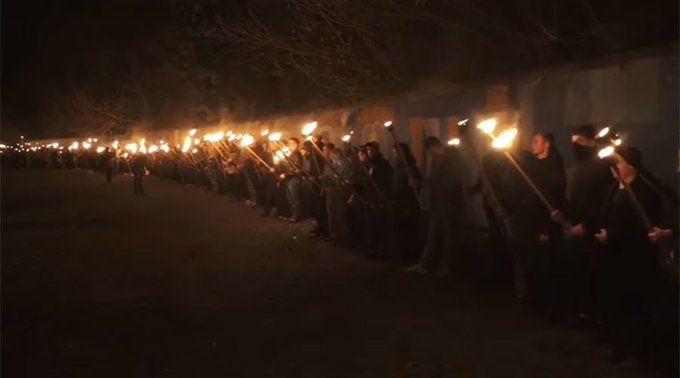The Sun’s silly claim Kiev is Russian masks bigger issue with resurgent fascism
Bryan MacDonald is an Irish journalist, who is based in Russia
The Sun's assertion Ukraine's capital is part of Russia might be laughable. But the revival of the far right in Eastern Europe isn't funny. And the future consequences could be appalling.
Hell hath no fury like 'Little Englanders' scorned. Since Russia was awarded the 2018 FIFA World Cup, in 2010, many British hacks have been behaving like a bunch of teenage boys spurned by a high school sweetheart. Just as tormented adolescents pine, they loathe the winning suitor because it has what they desperately want.
Thus, we’ve had a seven-year vilification campaign against Russian soccer from Fleet Street. Which reached a crescendo last summer when an endless flurry of front pages attempted to embed a narrative where thuggish Russians had beaten up helpless and lovable English hooligans in France. The general public didn’t fall for the false yarn because it takes two to tango. English fans are hardly known as shrinking violets.
This week, Britain’s best-selling newspaper, The Sun, went a step further. Its editors found a video depicting frightening racism from a soccer game between Dynamo Kiev and Shakhtar Donetsk, led by men with Nazi swastikas painted on their foreheads. In it, the protagonists stood behind a banner celebrating how they were “100% white” and chanted racially offensive insults.
Where In The World?
We can only imagine the unbridled joy in the newsroom when some dingbat announced how “that Kiev place is in Russia, ain’t it?” And lo and behold, before anyone could shout stop, the piece was published with the caption “Racism in Russia: Dynamo Kiev fans produce shock racially aggravated display in defeat to Shakhtar Donetsk.”
Except, these are not Russian football clubs. They are Ukrainian clubs playing in the Ukrainian league, supported by Ukrainian ‘fans.’ That’s right, that Ukraine. The British ally Ukraine, which receives overwhelmingly positive press coverage in Britain and is rarely, if ever, challenged for its human rights abuses, incredible corruption levels or the growing influence of the far right in the country.
On the same day, another news story broke from Kiev. Despite the presence of plenty of British correspondents there, you won’t find a mention of it in the UK newspapers. Or on state broadcaster BBC, which has an entire service, with lots of staff, devoted to Ukraine. That’s because it casts local politicians in a very bad light.
Heil Bandera
You see, a committee of Kiev City Council has agreed on a draft bill making 2017 the “Year of the UPA” (Ukrainian Insurgent Army). For those who don’t know about this organization, it was formed in 1942 as a military wing for Ukrainian nationalists. Fighting mainly in western Ukraine, it allied with Nazi Germany against the Soviet Union and became renowned for conducting horrible atrocities.
Perhaps the best known are the massacres of tens of thousands of Poles and Jews and other nationalities at Volyn during 1943 and 1944. Most of the victims were women and children and the methods used especially sadistic. They included stabbing pregnant women with bayonets in the stomach and children being forced to drink their murdered parents’ blood. After the Soviets had repelled the Germans, Stalin sent UPA members to gulags in Siberia and Russia’s Far East, where they featured heavily in Alexander Solzhenitsyn’s writing.
However, despite this being a genuinely important story, as it's an obvious example of the elected officials of a European state honoring murderous fascists, nobody in the Western press wants to cover it. And this myopia also explains why Ukrainian football supporters feel empowered to stage racist displays with impunity. Not to mention how torchlight processions by Nazis have become regular events in Kiev.
The Sun has been caught with its pants down. And, of course, it’s funny. But there’s a much bigger issue at play here. The United Kingdom is utterly complicit in the revival of the far right in Eastern Europe. By ignoring the issue, presumably, because these countries are useful allies against Russia, it legitimizes and encourages some very sick people.
How far will Nazi influence have to spread across the continent before British newspapers and politicians feel it's worthy of comment and coverage? That's a question which needs to be answered. Urgently.
The statements, views and opinions expressed in this column are solely those of the author and do not necessarily represent those of RT.





0 Comments:
Post a Comment
Subscribe to Post Comments [Atom]
<< Home